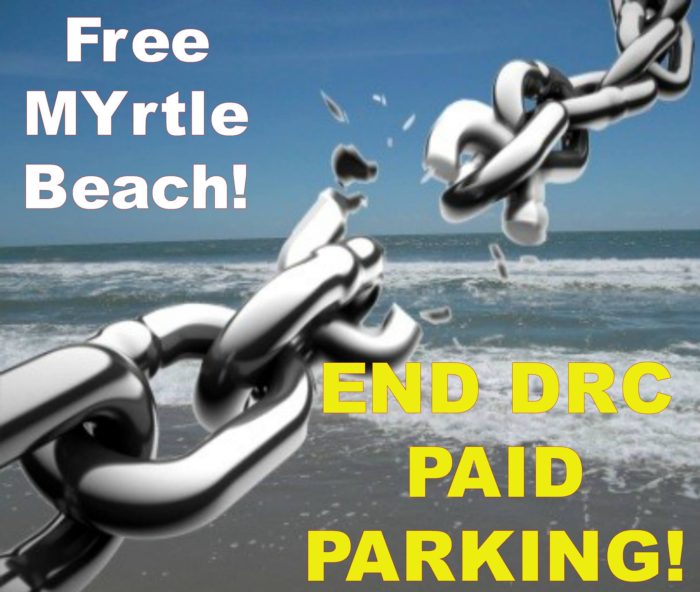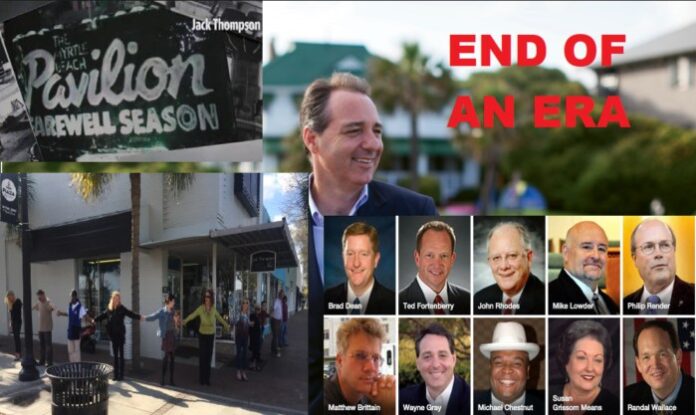The city of Myrtle Beach significantly transitioned into its own “next” this past Thursday, September 8, 2017. The event passed with few noticing.
Myrtle Beach City Councilman Wayne Gray chose to end his long political career by not signing up for the November elections. Accounting for a short three year break from 2002 to 2005, Mr. Gray has held court at Myrtle Beach City Council for the past 20 years. Confident and outspoken, he was consistently the most influential voice for all things Myrtle Beach government.
1998
Were you alive in 1998 when Gray first took office? If you were, here is what you were heard and saw:

My Heart Will Go On was a top 10 song
The movie Titanic was a block buster release
- Jan 26 President Bill Clinton says “I want to say one thing to the American people; I did not have sexual relations with that woman, Miss Lewinsky”
- Feb 23 Osama bin Laden publishes a fatwa declaring jihad against all Jews and Crusaders.
- May 14 Last episode of Seinfeld on NBC (commercials are $2M for 30 seconds)
- Sep 15 Google.com is registered as a domain name
THE GRAY ERA
The Gray era actually began with Wayne’s grandfather Philip. A native of Panama City, Florida, Philip made Myrtle Beach his home in 1945. In the early 50’s he started offering hotel supplies and opened a new business in 1956, ”General Chemical Supply Company,” name later shortened to ”Genco.” He also founded Grayco Steel Corporation.
Wayne Gray, himself, was a standout playing football at Myrtle Beach High School before entering local politics after graduating college.
His tenure at city council witnessed:
The Growth of the Hotel Industry Into Larger Structures, away from family inns.
The Tourism Tax: Wayne helped spearhead the 20% primary homeowner rebate. The over $20 million annual tax has made Brad Dean and the Myrtle Beach Area Chamber among the most powerful political forces in the state of S.C.
The creation of the Downtown Redevelopment Corporation, a quasi government not for profit with an unclear agenda and little accountability.
The closing of the Myrtle Beach Pavilion September 30, 2006.
The opening of Market Common April 2008.
The “tax payer” funded purchase of the Myrtle Beach Convention Center Hotel. The city still owes $57 million on that property.
The opening of the Myrtle Beach Boardwalk on May 15, 2010.
The decline of downtown Myrtle Beach with a rapid increase in homelessness, leaving vacant and closed buildings in the greater downtown where crime rates have increased well beyond those of neighboring beach towns.
Eminent Domain talks and the forced “tax payer” purchasing of private downtown properties.
The purchase of 22 area golf courses by shady Chinese investors.
An anemic business investment rate, as opposed to the city of North Myrtle Beach, Carolina Forest, and Highway 544 and Bypass 17 in Surfside Beach.
High profile conflicts

Defined by high profile conflicts with tourists and locals, downtown merchants have termed both Gray and those he governed with as Dramacrats. This name a result of ongoing, highly controversial and high profile negative headlines coupled with a diminishing Myrtle Beach brand name. Political skirmishes with Harley Bikers, Black Bikers, and Horry County residents over beach access parking in the Golden Mile all headlined the Gray Era.

Regardless of how Myrtle Beach history chooses to remember the Gray era of government, one issue can not be questioned. His group had an iron grip and complete rule over the city of Myrtle Beach. Working with a few powerful hotel owners, Gray and his colleagues were able to gain some control of the S.C. Statehouse, Horry County politics, and local media in a way that was previously unprecedented and is likely to never happen again.
It will feel odd not to hear his dominant voice and outspoken leadership come January 2018.
With the rise of social media, it has become clear that, regardless of election 2017 outcomes, no candidate is applying for the same jobs each once held.
Myrtle Beach has entered into a new era where both city and county residents are more informed and more active in what happens daily inside their city and county.
While the future is always unknown, perhaps Myrtle Beach is moving away from a tightly controlled, small corporate tourist town into a true resident run city.


